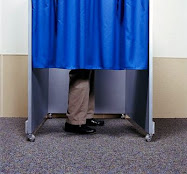
Even with a narrow victory in Indiana's Democratic primary Tuesday, Sen. Hillary Clinton failed to gain any ground on Sen. Barack Obama in the race for the Democratic nomination. Now the attention turns to whether or not Clinton's campaign will have the resources and the energy to move forward. Speaking to supporters Tuesday night, a noticeably fatigued Clinton indicated she could still remain in the race, at least until the end of the primary season June 3.
"These next primaries are another test," Clinton told supporters. "I'm going to work my heart out in West Virginia and Kentucky this month, and I intend to win them in the general election."
Clinton and Obama split Tuesday's primaries. In Indiana, Clinton bested Obama with 51 percent of the vote to his 49 percent. But in North Carolina, Obama notched a significantly larger win than some polls were predicting, garnering 56 percent of the vote to Clinton's 42 percent.
Obama's sizeable win in North Carolina means he will take the lion's share of the delegates up for grabs Tuesday, even when Indiana is factored in. So, despite the split decision, Hillary Clinton will fall even further behind in the overall pledged delegate count.
"Given how far she's come and how little time there is to go, I can't imagine [Clinton] drops out before the last primary," says pollster and Democratic strategist Mark Mellman. "The more places she wins, the better off she is, because it's all about talking points for superdelegates right now."
If she moves forward, strategists say Hillary Clinton faces an uphill fight with her campaign needing to find a way to keep the money flowing after Tuesday's results. The campaign also needs to convince superdelegates to hold off on making a decision until after the last primary vote is cast-a call Mellman thinks the supers are likely to heed. "There's still no clear objective criteria on which [superdelegates] can base a decision," he says. "I think some of them are just waiting to have the full picture before they decide."
Next up on the primary docket is West Virginia on May 13, followed by Kentucky and Oregon a week later. Clinton is heavily favored in West Virginia, where the working class white voters who helped carry her to victory in Ohio, Pennsylvania and Indiana make up an overwhelming majority of Democrats in the state.
With a win in Indiana under her belt, Clinton would look to bolster her electability argument with wins in places like West Virginia that give her another chance to tout her dominance among blue-collar white voters. She could also look to Puerto Rico, which votes June 1, where she can flex her muscle with Hispanics.
"If she shows real strength in a place like West Virginia and then can win a state like Oregon, the electability questions remain," says Democratic strategist Liz Chadderdon. "She's already proven there are a significant number of voters that are drawn to her over Obama."
With no poll numbers to parse just yet for any of the remaining states, the demographic make-up is the best indicator of how those contests may shape up. Democratic strategist Tad Devine says expectations will be high for Clinton in West Virginia, Kentucky and Puerto Rico. But Devine thinks the key state moving forward will likely be Oregon. "That state's going to have a lot of weight," he says. "It's a more progressive state that doesn't fit naturally into her column, so if she can win there it helps her chances and her argument immeasurably."
And despite primary fatigue from party insiders, Democratic voters appear anxious to keep the contest moving. A Gallup poll released Tuesday found that 60 percent of Democrats want both Obama and Clinton to continue their campaigns. Just 23 percent of Democrats said Clinton should drop out; 15 percent said Obama should leave the race. The same poll found that 45 percent of Democratic voters think the party's superdelegates should wait until the official end of the primary season June 3 to declare their allegiance. And a full 26 percent of voters want the supers to wait until the convention in Denver.
Coming into Tuesday, Clinton was some 415 pledged delegates short of the number needed to clinch the nomination-that count does not include Florida and Michigan. Obama was just 280 shy entering Tuesday. Come Wednesday, Obama will likely be within 200 delegates of reaching the magic number of 2,025 pledged delegates.
If the Clinton campaign decides to fight on, the race for the nomination could enter a contentious and confusing phase as the end of the primary season nears. The Democratic National Committee's Rules and Bylaws Committee is set to meet at the end of the month, where members will debate whether to seat the delegations from Michigan and Florida. Tad Devine says that meeting could be the start of weeks of procedural wrangling between the campaigns, assuming the Clinton campaign takes up that fight.
"Anything from inconsequential action to turmoil can come out of that process," Devine says. "It's really up to the campaigns to decide what they want the tone of this to be, because the rules are such that they could go as nuclear as they want if it drags on, especially if it gets to Denver."
And given the chance, says Liz Chadderdon, Hillary Clinton will take the fight to Denver.
"Hillary has proven that she doesn't go quietly, so I can only imagine they have figured out a path to victory," she says. "Now, do I think [the Clintons] would rip apart the party for her to be the nominee? ... I actually do, which is really quite a depressing thought for a Democrat."



















